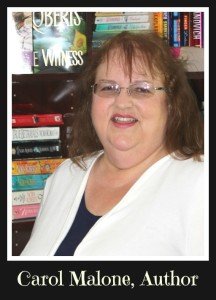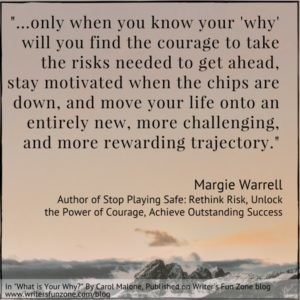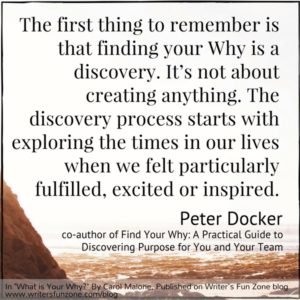What is Your Why? By Carol Malone
 Please welcome back author and book coach in-training Carol Malone. Today she’s sharing her article regarding the best ways to “Finding Your Why.” Enjoy!
Please welcome back author and book coach in-training Carol Malone. Today she’s sharing her article regarding the best ways to “Finding Your Why.” Enjoy!
***
I recently heard a speaker say, “Unless you discover your WHY, you’ll never become the person you were meant to be.”
This disturbed me. I thought I knew my WHY. But lately, I’ve been struggling to dig deeper into my creative well and find the WHY to continue to write.
What does the term “Your WHY” mean for you?
I wanted to discover what my WHY was and how to develop it or get it back.
I wanted to understand the search my WHY better, so I did some research.
In the article, Do You Know Your “Why?” 4 Questions To Find Your Purpose, the author Margie Warrell quotes a wise man on the subject:
“German philosopher Frederick Nietzsche once said, ‘He who has a why can endure any how.’
Knowing your why is an important first step in figuring out how to achieve the goals that excite you and create a life you enjoy living (versus merely surviving!).
Indeed, only when you know your “why” will you find the courage to take the risks needed to get ahead, stay motivated when the chips are down, and move your life onto an entirely new, more challenging, and more rewarding trajectory.”
According to Simon Sinek’s book, Start with Why, most of us know our WHAT and our HOW, but few people ever get the WHY. He made a creative chart he calls “The Golden Circle,” the WHY being the center and most desirable step.
“The Golden Circle” shows the circles of What, How, and the Why.
Sinek explains it this way:
“The outer section of the Golden Circle—the  WHAT— corresponds to the outer section of the brain—the neocortex. This is the part of the brain responsible for rational and analytical thought. It helps us understand facts and figures, features and benefits. The neocortex is also responsible for language.
WHAT— corresponds to the outer section of the brain—the neocortex. This is the part of the brain responsible for rational and analytical thought. It helps us understand facts and figures, features and benefits. The neocortex is also responsible for language.
The middle two sections of the Golden Circle—the WHY and HOW—correspond to the middle section of the brain, the limbic system. This is the part of the brain responsible for all our behavior and decision making. It’s also responsible for all our feelings, like trust and loyalty. But unlike the neocortex, the limbic system has no capacity for language. This is where ‘gut feelings’ come from.”
Sinek explains that the WHY comes from the limbic brain, like the center circle in the diagram. It’s responsible for feelings – not our heart or our gut. This is the biological place from which our WHY sprouts from.
According to Sinek:
“WHY goes much deeper to understanding what motivates and inspires us.  It is the purpose, cause, or belief that drives every organization and every person’s individual career.”
It is the purpose, cause, or belief that drives every organization and every person’s individual career.”
In the case of being a writer:
- Why do we write?
- Why do we get out of bed in the morning?
- And why should anyone care?
What does it look like when you know “Your Why”?
Sinek uses two examples of a sales pitch to paper company clients to show the beauty of knowing a company’s WHY.
Think of this in terms of telling people about your stories and books.
- Which sounds like the pitch you’d respond to?
Popular pitch – what and how:
We sell paper. We offer the highest quality product at the best possible price. Lower than any of our competitors. Wanna buy some?
Second pitch. Beginning with the company’s WHY:
What good is an idea if it can’t be shared?
Our company was founded to help spread ideas. The more ideas that are shared, the greater the likelihood those ideas will have an impact in the world. There are many ways to share ideas; one is the written word. That’s where we come in. We make paper for those words. We make paper for big ideas. Wanna buy some?
Let’s Review…
The first is based on facts and figures while the second is a deeper more emotionally engaging form which connects to customers’ personal values.
I do know that when I feel a company or an author really has my best interests at heart, or speaks to me from the place where I feel good, I’m more than likely to buy the product or the book.
What resonates with you about someone who really knows their WHY?
Life coach, best selling author and personal development guru Anthony Robbins says that if “you have a big enough ‘why’ then the ‘how’ is easy.”
What he means by this is that if you are highly motivated, inspired, or driven to achieve something, figuring out how to accomplish your goal is a lot easier.
How do we discover or cultivate our WHY?
In the article, 9 Things – Determine Your “Why,” by Thomas Phelps, Thomas suggests that finding your WHY begins with clarity:
“Before you begin on your path towards greater success in your sales career, you need to be crystal clear on why you want to enjoy greater success in your sales career. In fact, you need to get to the emotional point when being successful stops being a want and becomes a must!
Ask These Questions
Phelps recommends these questions to develop your clear “why.”
- What will I have in my life once I achieve my goal?
- How much better will my life be once I hit my target?
- What will I lose out on if I fail or give up?
- What areas of my life will be improved?
- What are the top 3 things that I will gain once I reach my goal?
Phelps says:
Your list of questions may be different.
Your list may be much longer, or you may only need one question to create a “why’” so big and inspirational that your success is just a matter of time.
Do whatever it takes to get you to the point where failure is simply not an option, and your desire to achieve success is so powerful that it gets you up in the morning and keeps you working towards your goal deep into the night.”
First Steps
I also like the discussion of WHY on Dan Schawbel’s site. He interviews David Mead and Peter Docker, who helped Simon Sinek write his book, Finding Your Why.
Schawbel asks Docker:
“What are the first steps to finding your ‘why’ and how do you make it unique to you and your career/life?”
Docker replies:
“The first thing to remember is that finding your Why is a discovery. It’s not about creating anything. The discovery process starts with exploring the times in our lives when we felt particularly fulfilled, excited or inspired. They don’t need to be big events – often the seemingly trivial memory may have biggest significance for us. What they do need to be is specific.”
Specifics
Specific moments in time trigger emotions. It’s those emotions that are usually linked to our values in life.
When we recount several of these specific stories, common themes emerge and point to our Why.
Because our Why comes from our past experiences, everyone’s Why is unique.
We may feel someone else’s Why is similar, but it’s the stories behind the Why that make each unique and authentic.
I’m getting the feeling I should do some digging into my past –- note the best times when things in my life were clicking on all eight cylinders.
For example, when I started writing full time. A college professor told me I had a gift and needed to share my writing. It was the first time in my life I’d received such a compliment. I was so jazzed, so “in the zone,” that I wrote six manuscripts in less than six months.
Unknown to me, those feelings of exhilaration kept me writing for hours each day was because I’d found my WHY.
So how can we gain deeper insight into ourselves, and a larger perspective on what we have to offer the world?
Another quote from Margie Warrell:
“As I wrote in Stop Playing Safe, your ‘life’s work’ sits in the intersection of your talents, skills/expertise, passions and deepest values… Reflect on the corresponding four questions below to help find the ‘sweet spot’ that sits in the intersection between what you care about, what you can contribute, and what will be valued most.”
1. What makes you come alive?
The word inspire comes from the Latin, meaning “to breathe life into.”
Accordingly, when you are working toward things that inspire you, it literally makes you feel more alive…
It’s about connecting with what you’re passionate about, knowing that when you focus your attention on endeavors that put a fire in your belly, you grow your impact and influence in ways that nothing else can.
2. What are your innate strengths?
In The Element, Sir Ken Robinson says that our element is the point at which natural talent and skill meets personal passion. When people are in their element they are not only more productive, but they add value and enjoy more personal and professional fulfillment… For a free strengths survey visit http://www.viame.org/.
As civil rights leader Howard Thurman once wrote, “Don’t ask yourself what the world needs; ask yourself what makes you come alive, then go do that. Because what the world needs is people who have come alive.”
Indeed they do.
3. Where do you add the greatest value?
Doing work that you’re good at, but which you loathe, is not a pathway to fulfillment.
That said, knowing your greatest strengths and where you can add the most value—through the application of your education, skills, knowledge and experience—can help you focus on the opportunities, roles and career paths where you are most likely to succeed and therefore find the greatest sense of accomplishment and contribution.
4. How will you measure your life?
People who don’t stand for something, can easily fall for anything.
Deciding how you want to measure your life means taking a stand for something and then living your life in alignment with it.
No matter what your job, you can draw meaning from it, and find greater purpose through how you do what you do…
If you don’t think you’re the kind of person you’d want to work with, then consider that it may not be because of the job you do each day, but your attitude toward it.
Knowing your purpose may compel you to take on challenges that will stretch you as much as they inspire you. Just as a boat under power can handle any size wave if perpendicular to it, when you’re powered by a clear purpose, there is little you cannot do.”
I’ve given you a lot of quotes and examples and steps to claiming your WHY.
The subject is overwhelming and deep.
Whichever way you choose to re-examine or re-connect with your WHY, maybe you’ll discover a new path and a new way of thinking and feeling.
Maybe you’ll find a clear filter to make good choices in your life — not just at work or with your writing — but something that will help build on who you are and when your’re at our best, as Margie says.
Whatever you learn along the way, you can pass on to others in your books and in your personal lives.
One last parting quote from Margie.
“Whatever we choose to do, moving toward something (e.g, a situation in which we can thrive) is always better than moving away from something.”
I wish you determination and resolution as you seek to discover your WHY. I’ll be working on mine.
***
ABOUT THE AUTHOR
 Award-winning author, Carol Malone writes new pulp-fiction suspense kissed with romance to rocket readers into the past. When not hammering out new tales, Carol is reading, or watching the Dodgers, HGTV, and the Food Network with her writer husband on the coast of California. She loves to connect with you and invites you to chat about romance and sports on her website, Facebook, or Twitter.
Award-winning author, Carol Malone writes new pulp-fiction suspense kissed with romance to rocket readers into the past. When not hammering out new tales, Carol is reading, or watching the Dodgers, HGTV, and the Food Network with her writer husband on the coast of California. She loves to connect with you and invites you to chat about romance and sports on her website, Facebook, or Twitter.
Check out Carol’s Books: New pulp-fiction suspense kissed with romance to rocket readers into the past
Fight Card Romance: Ladies Night ; Fight Card Romance: Ladies Night Christmas ; Summer Holiday









